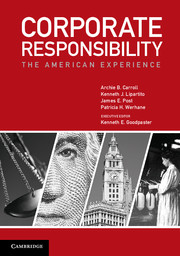Book contents
Introduction - The Corporation in the Public Square
Published online by Cambridge University Press: 05 November 2012
Summary
For two centuries, Americans have tried to reconcile two realities of modern capitalism. Corporations – capitalism's dominant organizational form – are very efficient mechanisms for producing wealth, meeting consumer needs, and building industries that employ millions. Yet corporations also often impose costly externalities on communities and the natural environment and cause unwanted transformational change. Government, citizens, and often business leaders themselves, have responded by insisting that corporations – individually and as a group – assume responsibility for more than their narrow economic results.
Corporate responsibility remains, however, a controversial concept. Should businesses have responsibility for providing society with health care, racial equality, support for education, arts and culture, while also minimizing climate change, promoting social optimism, participating in national politics, and effecting economic redistribution of wealth? Or should these “public goods” be the domain of government? Do corporations represent a progressive or regressive force in society? How has the debate over the appropriate degree of corporate responsibility evolved during different eras of American history, and how have corporations responded? The debate has grown broader and more complex as corporations have expanded their commercial influence, technological advances, and geographical reach. Where is it heading in the next few decades? When the revenues of our largest corporations exceed the gross domestic product of nations, and corporate profits set new records while vast segments of the population remain unemployed, people are prone to question the role, responsibility, and power of business.
- Type
- Chapter
- Information
- Corporate ResponsibilityThe American Experience, pp. 1 - 28Publisher: Cambridge University PressPrint publication year: 2012

